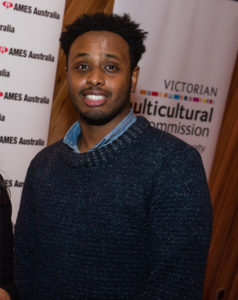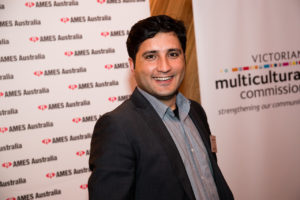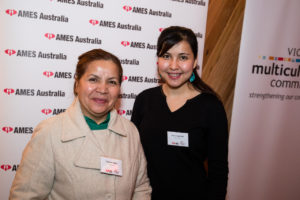Heartlands films a window on the refugee experience
A new series of short films is giving audiences a rare perspective on the refugee experience by presenting intensely personal and narratively diverse insights into the lives of a group of young refugees.
The 2016 Heartlands arts project brings together the stories of ten young people from refugee backgrounds under the theme of common humanity.
The ten short films tell stories about their lives and their communities; while celebrating a sense of togetherness in their shared circumstance as refugees.
Collectively they present a compelling and thought provoking set of stories that speak of their hopes and dreams as well as their challenges and issues.
Hailing from countries including Somalia, Burma, Afghanistan, Iraq, Iran, Sudan, Egypt and Pakistan, the young film-makers highlight their passions, hopes, dreams and journeys in a series of narratively disparate but emotionally connected short films.
Launched by settlement agency AMES Australia this month, the films provide a window into some of the communities who have found a safe haven in Australia in recent years.
AMES Australia CEO Cath Scarth said the aim of Heartlands was to transcend cultural barriers and reveal the humanity of people who make up Australia’s refugee communities.
“This year we are witnessing the largest refugee crisis in history. The number of displaced people around the globe is now over 60 million – more than at the end of World War II,” Ms Scarth said.
“The Heartlands project gives cinematic insight into some of the communities who have found a safe haven in Australia in recent years.
“The films are also an acknowledgement and a celebration of the cultural diversity that makes Victoria such a great place to live,” Ms Scarth said.

Abdul Ibrahim
Young film-maker Abdul Ibrahim, who fled the civil war in Somalia as a small child, said: “Heartlands is a fantastic opportunity for me to share the story of my community – its achievements and its challenges – with a wide audience,” he said.
Fellow Film maker Mehak is from Afghanistan and was an executive with human rights NGOs there.
He opposed the Taliban and was involved in trying to stop the trade of women in rural areas; trying to stop farmers growing opium; and, exposing government corruption.
Mehak was targeted by the Taliban and then later by some sections of the Afghan Government and was forced to flee.
His film is a quirky tale about his memories of his first computer.

Mehak
The early IBM model was considered “an American spy machine” by the Taliban and he was beaten and tortured because of his ownership of it.
“The film has allowed me to share a part of my life with people; to show that even though I am a refugee, I have the same hopes and ambitions as everyone else,” Mehak said.
“That computer was important to me. It was a key to the future and now, for me, it represents freedom,” he said.
Story teller Elnaz Tavancheh is an ethnic Hazara who fled her home in Iran to avoid persecution and threats.
She said the Heartlands Project gave her the opportunity to share her story and her passion for science with a wider audience.
“I’m really interested and I really think I can make contribution in this area if I’m given the chance,” Elnaz said.
“I think the film shows that I am just like anyone else. I have dreams and I want to pursue them. For me Australia is the perfect place to do that.
“Here everyone is equal and anyone who works hard can achieve what they want. There’s no one telling you you can’t do this because you are not one of us,” Elnaz said.

Elnaz Tavancheh on right.
Elnaz had just completed a year and a half of agricultural science studies at university in Iran when her family was reported to the government as illegal residents.
As an Afghan Hazara, she had lived all of her life as a second generation refugee in Iran.
For decades, the Hazara, an ethnic minority from Afghanistan, have been oppressed; banned from educational opportunities and professional or government jobs.
After fleeing to Indonesia from Iran and taking a dangerous boat journey to Christmas Island, she and her mother are now living in Melbourne’s northern suburbs.
Through connections she made while in asylum detention, Elnaz was able to study her VCE at Parade College – the first girl to attend the school in more than 100 years.
Now 20, she is studying biosciences at university and volunteering at the Melbourne Museum.
The Heartlands 2016 Arts Project will be at the Footscray Community Arts Centre, 45 Moreland St, Footscray, in the Roslyn Smorgon Gallery between June 17 and 30.
It will be screened at the Walker Street Gallery & Arts Centre, Corner of Walker and Robinson streets, Dandenong on 25 July, 26 July & 28 July at 11am, 12pm and 1pm.
It will be at the Wyndham Art Gallery, 177 Watton St, Werribee as part of the Wyndham Cultural Centre RACE exhibition between July 6 and August 28.
There will be special screenings of the films at the Australian Centre for the Moving Image, Federation Square on June 21 at 10am, 11am, 12pm and 1.15pm.
Click here to view the Heartlands 2016 arts project short promo reel.
Laurie Nowell
AMES Australia Senior Journalist












